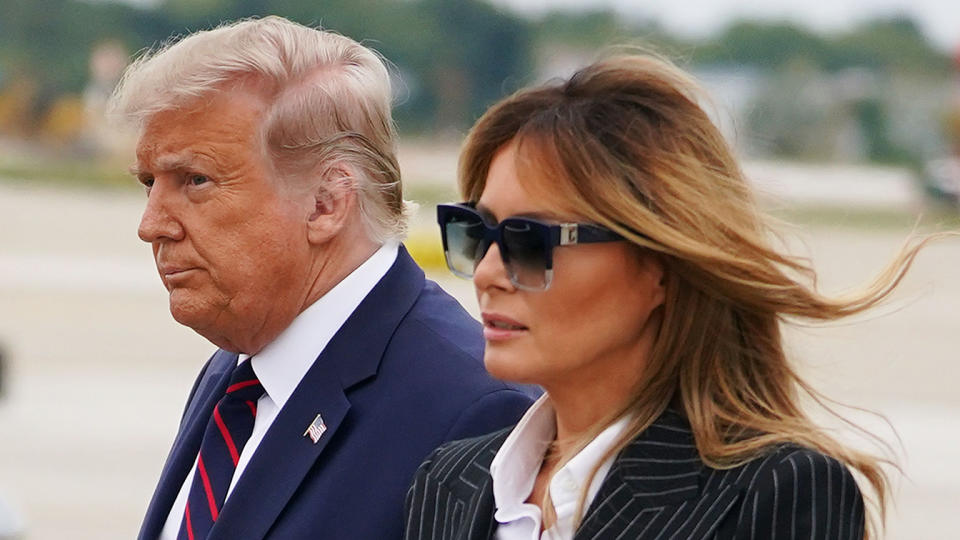From both sides, thoughts and prayers for Trump, some more heartfelt than others

The first reaction of many Americans to the news that President Trump has contracted the coronavirus was, naturally, to offer prayers for his recovery.
If what theologians call “intercessory prayer” could cure coronavirus, which has killed more than a million people this year, Trump would be a good candidate, since he numbers among his top supporters and advisers some of the nation’s most prominent evangelical pastors, such as Franklin Graham and Paula White-Cain, both of whom tweeted out prayers for the president and the first lady hours after their diagnoses were made public.
Robert Jeffress, the Texas evangelical pastor who is a leading Trump backer, said he would go on Fox Business channel to “discuss how praying for our great President @realDonaldTrump and @FLOTUS can help unify our country.”
Updating reporters on the president’s medical condition Saturday morning, White House physician Dr. Sean Conley began by conveying how “the president and first lady are extremely grateful for the enormous outpouring of thoughts and prayers” for their health.
Unfortunately, the evidence that third parties can be cured of disease by appealing to God is scanty at best. This was actually studied nearly 150 years ago by the eminent British scientist Francis Galton. Galton noted that despite the millions of prayers routinely offered for the health of members of the royal families of European countries, they died on average no older — in fact, several years younger — than other members of the nonworking classes, such as lawyers, who practiced a profession that even then didn’t tend to inspire mass devotion.
Nor has the coronavirus, in particular, shown itself to be susceptible to prayer, or the kind of wishful thinking Trump himself has engaged in throughout the pandemic. The United States, generally considered the most devout large Western nation, has also suffered the most cases and deaths. Brazil, another deeply religious country, is also a hotbed of infection.
When the White House coronavirus task force resumed holding briefings at the end of June, after a two-month hiatus, Vice President Pence’s message was, “I just encourage every American to continue to pray,” which no doubt many Americans were already doing, without much visible impact on the course of the pandemic. As far back as March, the television evangelist Kenneth Copeland, who served on Trump’s Faith Advisory Board during the 2016 campaign, announced that he had banished and “executed judgment” on COVID-19, a banishment that the virus clearly did not heed.
But still, Trump’s admirers sent him their prayers, along with the secular version, “thoughts.” So did his opponents, critics and rivals, such as MSNBC’s Rachel Maddow:
God bless the president and the first lady. If you pray, please pray for their speedy and complete recovery — and for everyone infected, everywhere.
This virus is horrific and merciless — no one would wish its wrath on anyone.
We must get its spread under control. Enough.— Rachel Maddow MSNBC (@maddow) October 2, 2020
And Sen. Bernie Sanders:
Jane and I wish the President and First Lady a full and speedy recovery. The COVID-19 virus is real, it is dangerous and can infect anybody. As a nation we must do all we can to fight this virus and protect the American people.
— Bernie Sanders (@BernieSanders) October 2, 2020
And New York Gov. Andrew Cuomo:
My thoughts are with President Trump and the First Lady and I wish them a full and speedy recovery.
This virus is vicious and spreads easily.
Wear a mask. Let’s all look out for each other.— Andrew Cuomo (@NYGovCuomo) October 2, 2020
The author Frank Schaeffer, a onetime leader of the evangelical right who now describes himself as “an atheist who believes in God,” tweeted that he was “praying for Trump” — “praying that Trump’s diagnosis will shine the harsh spotlight of TRUTH on Trump’s indifference to a pandemic that has ravaged the suffering United States he was sworn to protect but has repeatedly betrayed because of his malignant narcissism.”
And Trump’s opponent, Joe Biden, tweeted this generous sentiment:
Jill and I send our thoughts to President Trump and First Lady Melania Trump for a swift recovery. We will continue to pray for the health and safety of the president and his family.
— Joe Biden (@JoeBiden) October 2, 2020
That was in notable contrast to Trump’s own response, four years earlier to the day, to the news that Hillary Clinton was being treated for pneumonia. He made fun of her:
Donald Trump mocks Hillary Clinton over her pneumonia outbreak pic.twitter.com/feHjV6cLDa
— The Telegraph (@Telegraph) October 2, 2016
The other unknown is whether the attitude of the beneficiary of intercessory prayer matters. Trump’s reaction to being prayed for by Biden is unknown. But last year, when another prominent Democrat, House Speaker Nancy Pelosi, said she was praying for him, Trump wrote her a letter to say, in effect, don’t bother:
“Even worse than offending the Founding Fathers, you are offending Americans of faith by continually saying “I pray for the President,” when you know this statement is not true, unless it is meant in a negative sense. It is a terrible thing you are doing, but you will have to live with it, not I!”
As of Saturday morning there were conflicting accounts of Trump’s condition, but even by Conley’s optimistic assessment he was likely to remain in the hospital for several more days. Prayers for his health seemed warranted, whether or not they work.
_____
Read more from Yahoo News:
Trump's COVID-19 diagnosis throws presidential campaign into uncertainty
With Trump hospitalized for COVID-19, experimental therapeutics show some promise
As COVID spread through White House, top Trump allies and family members mingled at events in D.C.

 Yahoo Sports
Yahoo Sports 


